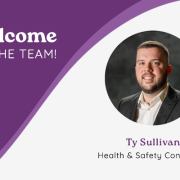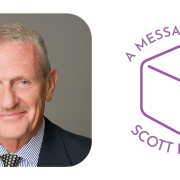
At The Lawson Group, we don’t believe in bad news. Just news. Information is critical to giving us the tools we need to better support our stakeholders—that includes our clients, employees, and investors. This transparency paired with a hands-on approach empowers us to make the changes we need to roll with the punches and continue to evolve.
Transcription:
It sounds trite to just say, “Oh, we’re always evolving, we’re always changing,” but we are. And most of the time—when we’re doing that—it’s not because our employees necessarily come up with an idea.
They come up with an obstacle and they come up with something that takes too much time, something that’s too expensive, something that isn’t efficient, something it doesn’t work well.
And there’s nothing that I hate more than being inefficient. If I’m going to spend an hour doing something, I want to get an hour’s worth of value out of it. I don’t want to spend an hour working on something where I get five minutes’ worth of value out of it, so we are constantly evolving and trying to do new things.
And I think that comes from again, what our people report back to us that they see on the front lines that we say is inefficient. So we try to come up with a solution to it and it keeps us changing and evolving all the time. We don’t just keep doing the same thing day after day after day.
Transparency is Essential
Yeah, we know we’re very different than a lot of employers out there, just in terms of the way we run our business and the way we treat our people.
We’re a family-owned business. We have tons of families who work with us. We have a couple of different siblings that work for us together. Husbands and wives, boyfriends, and girlfriends that work together.
And I say to people that when somebody comes in the driveway with a new car or we hear that they’re getting married or they’re buying a house or they’re having a child, the noose tightens a little tight around my neck in terms of the good decisions that Cheryl and I have to make to continue to run the business. It’s up to us to make sure these people have jobs that enable them to make those financial commitments.
It just puts more pressure on us to evaluate the business all the time to make sure that it can be profitable, it can continue to employ them, and it can continue to pay them very well.
To that point, when we do poorly, everybody knows that we’re doing poorly and we all bear the brunt of it. Knock on wood. We haven’t been in that situation for quite some time now.
Fair Treatment is at the Heart of What We Do
It’s quite the opposite now. We’re actually doing very well financially. So, for example, in the middle of this whole COVID crisis right, we gave everybody a $1,000 bonus as thanks for sticking with us.
We understood what a pain in the neck it was to deal with this and work from home or come to work and have to wear a mask. We just wanted everyone to know how much we appreciate their effort, so everybody got a thousand-dollar bonus.
We still pay for 100% of our employee’s health insurance. Hardly any companies in the state of New Hampshire do that anymore.
Last year, between us, eating the increase in the cost of our health insurance, giving everybody a cash bonus money that we put into our 401K plan as a discretionary match on top of the match that we already put into it, and giving everybody a pay raise, I think we spent about $400,000 on employee benefits by the end of the year, and we were only able to do that thanks to our employees’ hard work.
It’s not because of what Cheryl and I do at the top of the heap. We always say our employees give us the ability to make decisions. When business is doing well and we’re making money, the decisions are pretty easy to make.
The decisions get a lot harder when we’re not making any money because then we can’t provide the benefits program that we’d like to provide to employees. These benefits allow and encourage our employees to do their best work on the front lines because they get personally and financially rewarded for it.
We Take and Break News in a Way That’s Effective
People can’t say, “Well, I got some bad news for you.”
It’s not bad news. It’s news. I can’t do what I have to do for my job and the customers that I’m trying to support without information.
If you think it’s bad news, it’s just news.
For example, if you can’t get me the stuff in the two weeks’ you promised, and today’s the day it was meant to be here, it would have been nice to know that a week or two ago.
I don’t do that anymore.
I’ve learned now that when somebody says they’ll get it to you in two weeks, it’s best to tell the customer that while the anticipated delivery date is two weeks, I can’t guarantee it. But, I will actually call the vendor or whoever it is to say, are we still on track to get that stuff in two weeks’ time?
Big Change Takes Time
Fifteen years ago, we tried to start a program where we started a self-insurance group of some of the self-insurance groups in the state to provide excess insurance or catastrophic insurance.
If you have a major claim, a million-dollar claim, we can go to that trust to get money to pay that claim first before we go to an excess insurance company. We pay a lot of money to access insurance companies for that catastrophe insurance. But if we’re paying ourselves for it, there aren’t too many catastrophe insurance claims rather than any of these groups have.
It’s a way to make money, which in turn then drives down the cost for these other self-insurance groups.
Long story short, 15 years ago, we tried to get it off the ground. Several of the other self-insurance groups got cold feet at the last minute, and they failed.
We just started to do this again about two years ago, because now we manage three self-insurance groups. We convinced all three it was worthwhile to do.
The projections are that if we do nothing other than charge the premiums that we’re charging them right now, and with the expected claims that that group might have, they’ll have between $12-13 million in the bank in 10 years.
That won’t happen because if we are that successful, that much money would start to pile up, it would go back to the individual groups in the forms of either dividends or to help pay premiums, but it will ultimately save those groups probably something north of a half a million dollars a year between the three of them when this thing is successful, i.e. two or three years down the road when they have enough money in the bank.
To the best of our knowledge, nobody else in the country that’s been able to create an entity like that that solves that problem. The Labor Department in New Hampshire helped us do that. They thought it was a great idea and encouraged us to do it, and it took us almost 18 months to get that off the ground and to get it to work.
We’re talking right now with the Labor Department about a couple of other unique things to do in terms of simple stuff like payroll audits. We have to go through payroll audits every single year, which takes us four or five-six months to get payroll audits done.
So right now, we’re trying to come up with an entirely different way to do payroll audits that’s more efficient, that’s more optimizing so that we make better use of people’s time. We don’t have people wasting their time or money to do something that’s a very routine task.





